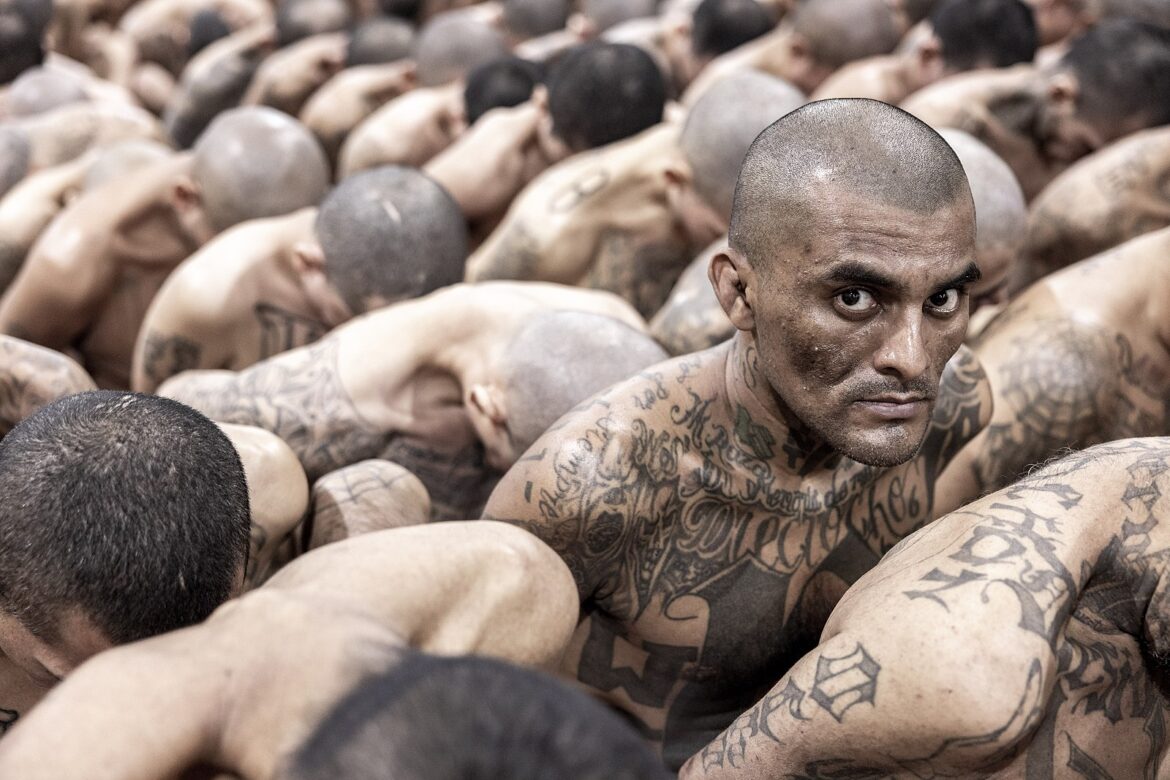At the end of February, President Bukele of El Salvador posted a video on Twitter that has since become viral and prompted divisive discussion. The video shows hundreds of detainees being transferred to the Center for Confining Terrorism (Cecot)–a new mega-prison that is said to be the largest in the Americas. Prisoners are shown shaved, stripped down into white shorts, and crammed into close quarters. The construction of the mega prison and mobilization of detainees is Mr. Bukele’s most recent move in his ‘iron-fist’ approach to crime. Human rights agencies have heavily criticized his decision.
In 2021, Human Rights Watch published a harrowing report that detailed gang violence and crime in El Salvador. The report found that the gangs exercised territorial control over neighbourhoods and practiced extortion on residents throughout the country. Additionally, the forcible recruitment of children and the sexual abuse of women, girls, and LGBTQ+ individuals have been associated with criminal gangs. Multiple reports of gang-driven killings, disappearances, rapes, and displacements, also exist, shedding further light on the epidemic of crime present in El Salvador. For example, from January 2014 to October 2019, police registered almost 12,000 disappearance victims. The scope of gang violence in El Salvador is facilitated by the high number of gang members in the country; in 2020, there were an estimated 60,000 gang members.
However, crime is not exclusively conducted by gangs. Security forces have committed extrajudicial executions, sexual assaults, enforced disappearances, and torture. Prior to the state of emergency, police systems were ineffective in protecting populations from gang violence and instead were guilty of collusion. Numerous security and elected officials have collaborated with gangs, including for electoral campaigns. President Bukele’s government has been accused of negotiating with MS-13 (El Salvador’s most prominent gang), allegedly granting jail privileges to their imprisoned members in exchange for their commitment to lower the homicide rate, resulting in increased public support of Bukele’s government in the February 2021 elections.
In March 2022, gang violence erupted, resulting in over 60 deaths in a single day. The killings represented the country’s deadliest day since El Salvador’s civil war 30 years before. In response, President Bukele declared a state of emergency and suspended key constitutional rights. While the measure was meant to be temporary, it remains in place today.
In the past year, El Salvador has seen exhaustive change. The military patrols the street conducting daily mass arrests, and jails are beyond maximum occupancy. Critics of the measure argue that the nation is effectively a police state. They have pointed to rumours that some police commanders have established an arrest quota policy for their officers and to speeches from Mr. Bukele, where he publicly supports the security forces or personally intimidates independent judges and prosecutors. The President justifies the ongoing human rights violations in El Salvador by classifying them as “errors” in the government’s war on crime. Furthermore, he is quoted saying that the government will be “watching judges who favour criminals,” essentially threatening judges and prosecutors from investigating human rights violations or releasing detainees who were arrested unlawfully. Mr. Bukele’s intimidation strategy works to impede judges and prosecutors from offering justice to individuals detained on the suspicion of gang association, rather than on the basis of crimes committed.
President Bukele’s methods, while problematic, have garnered some notable results. In 2015, there were approximately 103 homicides per 100,000 inhabitants in El Salvador; in 2020, the figure dropped to 20; last year, the figure was its lowest in years at 8 homicides per 100,000 inhabitants. Between January 2022 and October 2022, 463 people were killed in El Salvador, which is a 50 percent drop compared to the same period in 2021. Currently, El Salvador has a lower homicide rate than Honduras, Mexico, and Colombia.
Extortion is a key revenue stream for gangs and has decreased drastically over the past year. The country’s security minister claims that extortion cases have fallen by 80 percent since the state of emergency began. Due to the lack of transparency by the Bukele government, figures like these are tough to deem credible. However, experts claim there has undoubtedly been a notable reduction in crime since implementing the state of emergency in El Salvador.
Many attribute these results to the mass incarcerations run by President Bukele’s regime. Since the state of emergency, more than 60,000 people have been sent to prison, amounting to an average of over 150 people per day. Critics of Bukele’s policy are concerned that the overpopulation of prisons will offer gang members optimal conditions to recruit new members for crime syndicates. Moreover, prison conditions have been perilous. According to a local NGO, Cristosal, at least 80 inmates died in unclear circumstances between March and October last year.
Critiques of President Bukele’s methods are concerned with the human rights abuses conducted by his regime and democratic backsliding. El Salvador has prioritized state security over constitutional rights– so much so that some residents in poor neighbourhoods who once feared gang members say they are now more afraid of the Salvadoran police. Despite these critiques, President Bukele has unparalleled support from his population: a poll by the Salvadoran newspaper La Prensa Gráfica found that 89% of Salvadoreans approved of Bukele’s regime. Public support of Bukele is certainly related to the short-term success of his policies; however, given the generally negative long-term outcomes of police states, human rights agencies are correct to critique Bukele’s government.
Edited by Sabrina Nelson
Claudia Velimirovic is in her fourth and final year at McGill University pursuing a major in honours International Development and a minor in Social Entrepreneurship. This is her third year writing for Catalyst and she is particularly interested in politics, gender inequality, and women’s health.

